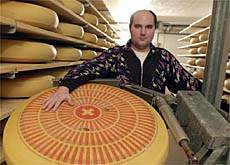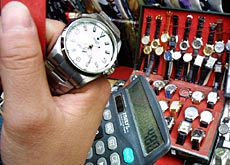Imitation goods threaten Swiss producers

Switzerland's cheese and watchmakers are demanding better global protection to prevent copycat versions of their goods.
They say imitation products are threatening livelihoods and undermining hard-won reputations.
Swiss producers added their voice to a chorus of similar complaints by manufacturers from around the world at a conference in Geneva this week.
The aim of the meeting was to highlight the problems faced by makers of specialised and regional goods, such as Swiss Gruyère cheese or Indian Basmati rice.
“We cannot compete with mass-production copycats on the international market,” said Beat Stierli, who represents Switzerland’s Tête de Moine cheese makers.
“Cost and taste-wise, our products are different and that’s why we need international protection for these goods,” he told swissinfo.
Place of Origin
The conference, which was attended by producers from Africa, Asia, Europe and the Americas, also saw the launch of a new organisation known as “Origin”.
It is the first international body dedicated to defending “Geographical Indication” labels (GIs).
In most countries, GIs are used to identify the place of origin and authenticity of various types of products, from watches and knives to oil and ham.
But international legislation on GI protection is full of loopholes, often allowing foreign companies to copy products but label them as authentic.
“The Swiss watch industry is very affected by this problem because some ‘Swiss’ watches are produced abroad,” said Laurent Paichaut, a legal adviser for the Federation of the Swiss Watch Industry.
“For example, in Hong Kong and China, manufacturers can use the description ‘Swiss Made’ if they use at least one Swiss mechanism in their watches… but here in Switzerland, we have much higher standards,” he told swissinfo.
Lobbying effort
Currently, only wines and spirits enjoy full protection under the World Trade Organization’s (WTO) agreement on Trade Related Intellectual Property Rights (TRIPS).
But Origin is hoping to convince members of the WTO at their meeting in Mexico in September to reinforce the existing agreement and protect all geographically-specific products.
“We have been knocking on the door of the WTO without success,” said Anil Adlakha, India’s representative to the conference.
“But we have now come together under this umbrella to pursue this issue relentlessly… because we need protection, not lip service.”
The organisation is also pushing for the creation of a legally binding international registry for GIs, which would allow producers to defend their regional labels more easily.
Pierre-Louis Girard, Swiss ambassador to the WTO, and the European Union’s representative, Carlo Trojan, have both thrown their weight behind the initiatives.
“Switzerland has a certain number of very famous products and has defined exactly how and where these items can be made,” Girard told swissinfo.
“There must be some reward and protection for producers who have accumulated knowledge and experience over the years,” he added.
Cultural heritage
The founders of the organisation argue that “place of origin” labels play an essential role in protecting cultural heritage and promoting sustainable development.
“GIs are anchored to a particular region and as such, contribute to the socio-economic dynamics in many regions of the world,” the conference organisers declared in a joint statement.
“They also create and support jobs, encourage diversification in production and preserve native traditions, which often reach back to distant ancestors,” they added.
Jacques Henchoz, a traditional alpine cheese maker from canton Vaud, agrees that without better international protection, products will continue to be copied.
“In order to defend Switzerland’s rural farmers and their savoir-faire, it’s important to preserve and protect this cultural and gastronomic heritage,” he said.
Limitations
Henchoz makes Etivaz, one of six Swiss cheeses protected under the Federal Agriculture Office’s “Protected Denomination of Origin” system.
This classification means that a cheese maker in canton Bern, for example, cannot claim to make Etivaz.
But there is no international legal framework to stop a company in Australia or Wisconsin from labelling a cheese “Etivaz”.
According to Beat Stierli, many cheese makers, including those of Tête de Moine, deliberately avoid exporting their products for fear they will be copied and mass-produced by someone else.
“Fifty per cent of our product is exported to Germany and France… We’d like to go further but we need international protection,” he told swissinfo.
“If we invest in an international market like North America, we need to know that they won’t be able to steal our product… otherwise, we are lost,” he added.
swissinfo, Anna Nelson in Geneva
Origin is the first international organisation dedicated to defending “geographical indications” (GIs), used to identify the place of origin and authenticity of various regional products.
The World Trade Organization grants some protection to products labelled with GIs, but only wine and spirits are fully protected.
Twelve products, including cheese, bread, meat and corn, have been granted protected status in Switzerland under the Federal Agriculture Office’s “Protected Denomination of Origin” system.
They include six types of cheese: Etivaz, Tête de Moine, Gruyère, Vacherin, d’Alpe Ticinese and Sbrinz.

In compliance with the JTI standards
More: SWI swissinfo.ch certified by the Journalism Trust Initiative


You can find an overview of ongoing debates with our journalists here . Please join us!
If you want to start a conversation about a topic raised in this article or want to report factual errors, email us at english@swissinfo.ch.